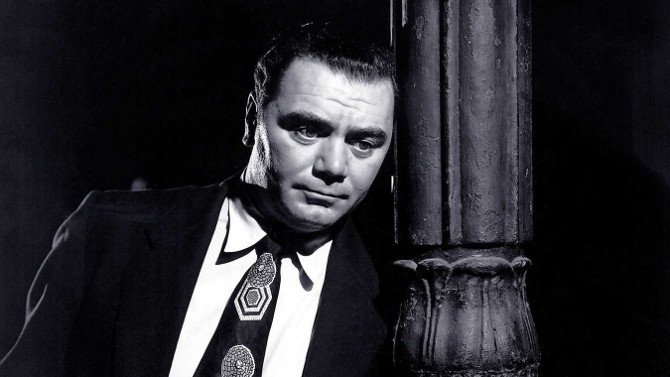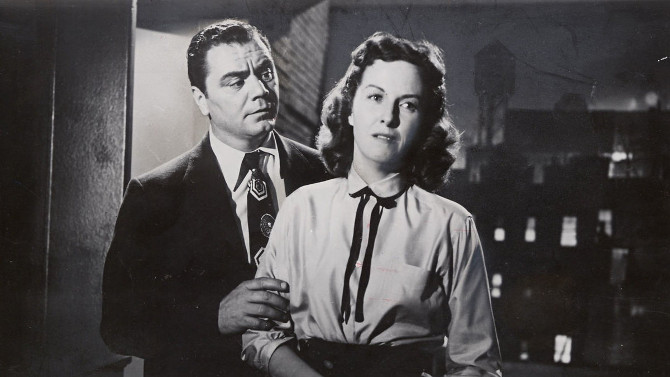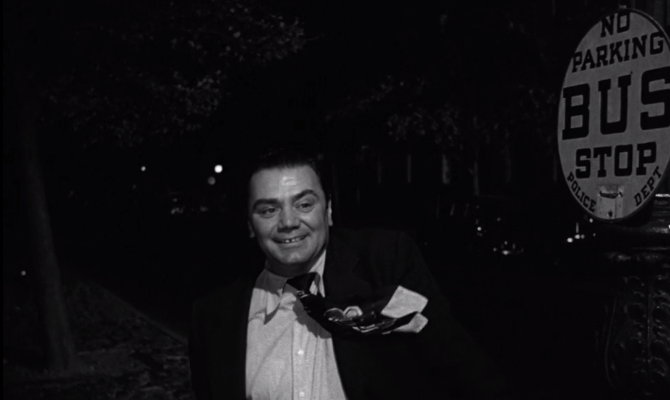Taking the world by storm, 1955’s Marty, a simple, heartfelt, honest, and poignant story of one man’s Saturday night (and the following Sunday), won both the Palme D’Or at the Cannes Film Festival (the first year the award was named thusly) and Best Picture at the Academy Awards – the first, and to date, only motion picture to win both coveted prizes (though Billy Wilder’s 1946 film noir The Lost Weekend also won the two top prizes, though at that time, the Cannes Award was known as the Grand Prix du Festival International du Film). It was also a major box office sensation.
Following thirty-four year old butcher Marty Piletti (Ernest Borgnine – acting since 1951, he had his first big break in 1953’s From Here to Eternity), he is an everyman – a warm, caring, short man who is a little heavy round the middle. . . in his mid thirties, he is the last in his large Italian-American family to remain unmarried.
Tired of all of the loss and rejection, he has nearly given up on finding that special someone, instead, he enjoys chumming around with best friend Angie (Joe Mantell), spending time at home with his mother Teresa (Esther Minciotti), and putting himself into his work – he has been approached by his boss with an offer to purchase the business.
With his mother fearing that she may have a confirmed bachelor on her hands for the rest of her life, she prods him to go out to a nightclub, so, on a Saturday (like so many before), he heads out with equally single Angie to the Stardust Ballroom.
In what seems like any other evening – one of failure, he is approached by a slick fellow who asks him to take his blind date off his hands. . . Marty, offended by the man’s treatment of the woman, says no. He then follows him, discovering that he tries the same trick with another guy (who agrees) – the jerks end up breaking the girl’s spirit.
Stepping in, Marty comforts the young woman, a teacher named Clara Snyder (Betsy Blair). . . a twenty-nine year old who is equally unlucky in love – seen as homely and unattractive (though she would be described as simply plain), she too lives at home with her parents – an introverted, fragile human being.
Spending the night walking the streets of New York City, Marty hasn’t talked so much in a dog’s age (usually more of a listener), while Clara flowers with the newfound attention. It seems like a match made in heaven. Yet, will this random connection be able to hold strong?
Not just a tale about Marty and his troubles, like in life, his family and friends play an integral part. Though the man has had the best night ever, his mother, always the meddler, begins to fear that a marriage may make her obsolete (a notion placed in her head by her sister Catherine – played by Augusta Ciolli, who is going through the same thing with her son and daughter-in-law), while Angie, who feels like he has been spurned by his best friend (after he ditched him at the club for the girl), discourages him from going out with the ‘lackluster’ woman. Spreading rumours, Marty’s Sunday is packed with peer pressure and rumours about how he spent the night with a real mutt. Though he is supposed to call Clara at two-thirty, he is now doubting himself. . . will he make the call and continue the newly formed courtship?
With an undeniable heart and a beautifully written realism, the narrative really centres on Ernest Borgnine’s masterful portrayal – casting perfection. With no dimpled chin like Cary Grant, or angular features like Clark Gable, and missing the height of a Jimmy Stewart, Borgnine is not your prototypical leading man, yet his charm and charisma is effervescent – a magical smile, twinkle in the eye, and comforting relatability drawing an easy bond to the audience. Every time he was onscreen, it was no different (I remember the audience being overjoyed to see his little cameo in 2010’s RED), and this is arguably his most iconic role – he won the Oscar for Best Actor for this dramatic, funny, subtle and all-together genuine lived-in performance.
With the shortest running time of all Best Picture winners, Marty is not short on anything that matters – superb performances (Blair must not be forgotten, for she is a match for Borgnine), a heart-warming and emotionally rich story, solid cinematography (Joseph LaShelle – Laura; The Apartment), and a quality score (Roy Webb – Notorious; Out of the Past). . . or, as screenwriter Paddy Chayefsky (who also won an Academy Award) called it, “the most ordinary love story in the world”. The movie also made history with another first, as director Delbert Mann also won the Oscar – the first time a director making his first feature won the award (Robert Redford would be the second in 1980 for Ordinary People). So, make the call and experience this charming motion picture, it is the right cut!



